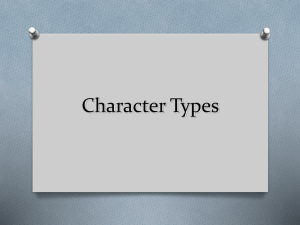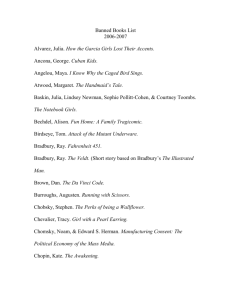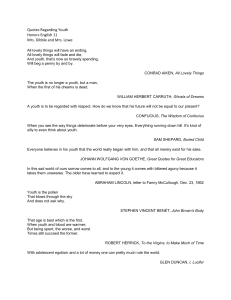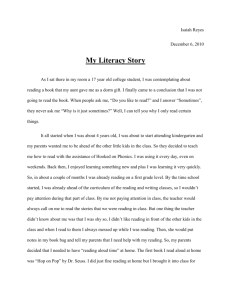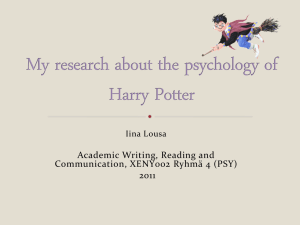Finnigan Stephanie Finnigan Logan Bearden ENC 1145
advertisement
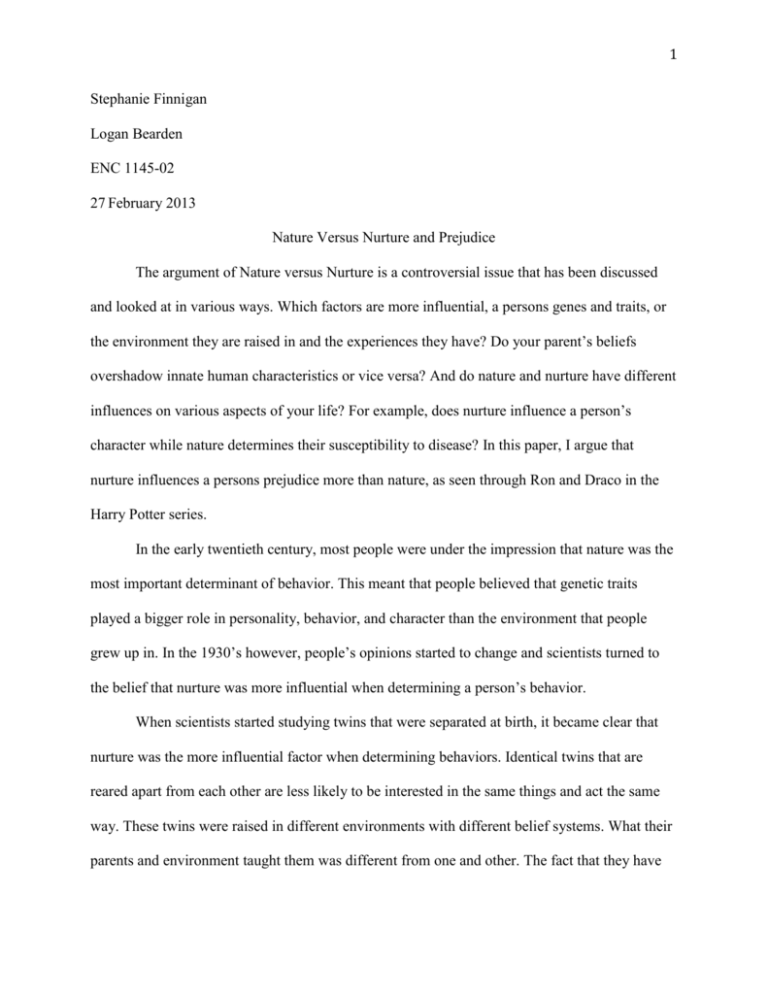
1 Stephanie Finnigan Logan Bearden ENC 1145-02 27 February 2013 Nature Versus Nurture and Prejudice The argument of Nature versus Nurture is a controversial issue that has been discussed and looked at in various ways. Which factors are more influential, a persons genes and traits, or the environment they are raised in and the experiences they have? Do your parent’s beliefs overshadow innate human characteristics or vice versa? And do nature and nurture have different influences on various aspects of your life? For example, does nurture influence a person’s character while nature determines their susceptibility to disease? In this paper, I argue that nurture influences a persons prejudice more than nature, as seen through Ron and Draco in the Harry Potter series. In the early twentieth century, most people were under the impression that nature was the most important determinant of behavior. This meant that people believed that genetic traits played a bigger role in personality, behavior, and character than the environment that people grew up in. In the 1930’s however, people’s opinions started to change and scientists turned to the belief that nurture was more influential when determining a person’s behavior. When scientists started studying twins that were separated at birth, it became clear that nurture was the more influential factor when determining behaviors. Identical twins that are reared apart from each other are less likely to be interested in the same things and act the same way. These twins were raised in different environments with different belief systems. What their parents and environment taught them was different from one and other. The fact that they have Finnigan 2 the same genes is not enough to overpower the environment that they were raised in. If this is true for twins, it is extremely plausible that it is true of people that do not have identical genes (Nature Versus Nurture: Twin Study Overview). It is evident that nature is the most dominant factor in determining your beliefs, but how strongly does this correlate with prejudice? In the Harry Potter series, Ron and Draco are prime examples of just how much of an impact nurture can have on the prejudices you have against people. Both of these characters have the same nature (they are pure-blood wizards), yet their views on stereotypes and prejudices in the Wizarding world are polar opposites. This can be attributed to several things. In Harry Potter and the Chamber of Secrets, J.K. Rowling provided a deeper insight into the families of Draco and Ron. The Weasley’s are a poor, red-headed, accepting and relatively non-prejudice family. The Malfoys on the other hand are a wealthy, prejudice family who fully believe in the dominance of pure-blood wizards. Mr. and Mrs. Weasley have never taught their children that they are better than others because they are pure-blood wizards. Mr. Weasley is even obsessed with “muggles” and collects “plugs” and other muggle artifacts. When he is introduced to Harry, one of the first things he says is “what exactly is the function of a rubber duck?” This goes to show that the environment that Ron grew up in was one that instilled a mindset of equality and tolerance towards others. Draco’s family however, is nothing like the Weasley’s, and consequently, Draco is nothing like Ron. Mr. Malfoy shows contempt and hatred for “muggles” and “mudbloods” alike. He even views “blood traitors” like the Weasley’s as less than him and his family. This shows readers how Draco developed his air of superiority and his prejudice towards people of a different status than him. Finnigan 3 In Harry Potter and the Sorcerers Stone some of Draco’s first words to Harry are, “you will soon find out Potter, that some Wizarding families are better than others. You don’t want to go making friends with the wrong sort. I can help you there” (pg. 81). It is evident, from learning about his background and upbringing, that Draco was taught to think this way. Not all wizards believe that “some families are better than others” but Lucius Malfoy does, and he has imparted this prejudice into his son. The differences between the home lives and family values (the nurture) of these two characters play a major role in the amount of emphasis and belief they place on prejudices. Finnigan 4 Bibliography Brown, Karen A., and Gordon W. Allport. Prejudice in Harry Potter's world: A social critique of the series, using Allport's The nature of prejudice. College Station, TX: Virtualbookworm.com Pub., 2008.I García, Coll Cynthia T., Elaine L. Bearer, and Richard M. Lerner. Nature and nurture: The complex interplay of genetic and environmental influences on human behavior and development. Mahwah, NJ: Lawrence Erlbaum, 2004. "Nature vs. Nuture - Twin Study Overview." Nature vs. Nuture - Twin Study Overview. N.p., n.d. Web. 17 Feb. 2013. Rowling, J. K. Harry Potter and The Chamber of Secrets. London: Bloomsbury Pub, 1998. Print Rowling, J. K. Harry Potter and the Deathly Hallows. London: Bloomsbury Pub, 2007. Print Rowling, J. K. Harry Potter and the Half-Blood Prince. London: Bloomsbury Pub, 2005. Print Rowling, J. K. Harry Potter and the Philosopher's Stone. London: Bloomsbury Pub, 1997. Print Rowling, J. K. Harry Potter and the Prisoner of Azkaban. London: Bloomsbury Pub, 1999. Print "Social Psychology Blog.": Blog 1: The Influence of Nature and Nurture on Prejudice, Stereotyping and Aggression. 20 Feb. 2013 <http://ruthssocialpsychblog.blogspot.com/2007/09/blog-1-influence-of-nature-andnurture.html>. Sternberg, Robert J., and Elena L. Grigorenko. Intelligence, heredity, and environment. Cambridge: Cambridge UP, 1997. Print

